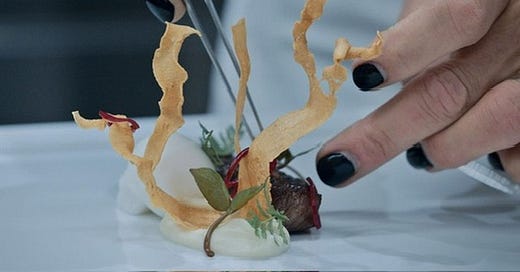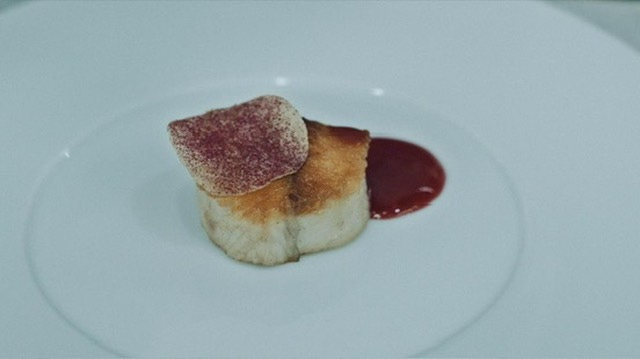☀️Dispatch: 🍳The Bear, 🍽️Unreasonable Hospitality, 🤩Obsession, and 🍜Food
Is it too late to write about The Bear?
Is it too late to write about The Bear? The noise around the show has faded out in the mainstream media.
I, for one, haven’t been able to shake off the show — you know the almost-physical-shaking-off you do when you have just finished watching. The big sigh. A deep sense of relief, and sometimes curiosity. In this particular case, I have none. It’s no surprise then that Forks (S2 E7), Christmas (S1), Taylor Swift’s words “We were both young when I first saw you..”, Claire's (Molly Gordon) eyes, a new-found love for Sydney (Ayo Edebiri), and the unsettling mother-daughter relationship in Needles (S3 E?) have all stayed with me. What’s surprising though is the fact that none of these takeaways are food-related.
If one watches Sydney make the now-viral omelette — the light tapping of the egg on the counter, the sieving, butter swirling on the hot pan, her slow, calculated movements, the chives, the crushed potato chips, and the beetroot orange juice mix — one could almost get away with believing that The Bear is all about food. Or maybe it is a BTS into how restaurants work. Or as if the show were Anthony Bourdain’s Kitchen Confidential interspersed with recipes from a Noma cookbook. In Tomorrow (S3E1), you see montages of Carmy cooking and perfecting dishes in the settings of his and other restaurants in the background. And, even though we don’t see any of these dishes closely, there’s always a sense that the food is the hero. Much like the movie The Great Indian Kitchen, the show is a microcosm that uses food as a medium to talk about a larger, often invisible narrative. But, most importantly, it captures the dynamics of people within those four walls and sometimes beyond. I won’t even get into the comedy/drama debate that took place after the show got nominated under comedy for the Emmys. Dramas can have a few laughs, but comedy cannot be so dark.
The author of Unreasonable Hospitality: The Remarkable Power of Giving People More Than They Expect, Will Guidara is the former co-owner of Eleven Madison Park. Incidentally, it’s the same book Richie (Richard Jerimovich) reads in the episode Forks, where he learns everything he needs, to fall in love with the joy of selfless service. Guidara talks about dreamweavers in the book – a concept I first noticed in the episode Forks. At Ever, when the host knows that a certain guest has been saving up for the meal (through her Instagram), he decides to make the meal complimentary. What was done at EMP with New York hotdogs was replicated by Richie with the Chicago deep-dish pizza. This act of going above and beyond expectations while dining at a restaurant is the job of dreamweavers. Even when one sees Richie debrief the FOH (front of the house), it’s almost as if he’s walking in Will’s footsteps of how people can feel perfection. For Guidara, going above and beyond “ isn’t the lavishness of the gift that counts, but its pricelessness”. He then went on to co-produce Season 3 and co-wrote the episode Doors.
A lot of the inspiration that came from the book was implicit. Guidara mentions in the book, “Relationships are simple. Simple is hard.” and it’s somewhat what The Bear embodies throughout the series — it always seems to come down to the relationships between characters in the show and their dynamics, tensions with themselves and with each other. Although, that’s not all ... I do believe, through the virtue of experiences, that ‘unreasonable’ stems from informality. It’s the act of adding a few sprigs of curry leaf, and green chilli to your vegetable bag, every time you buy vegetables from the sabziwala. What is it if not unreasonable hospitality?
From a cinematic POV, the show is unlike any other. It builds on people’s appetite to know you, the ‘person’. Every character in the show has an arc that explains their motivations, fears, insecurities and, most importantly, who they are when no one’s looking.
Apart from all the research and development — consulting with real-life chefs on the show (Courtney Storer, Matty Matheson, Brian Lockwood), shooting in actual restaurants (Noma, Ever, Daniel, French Laundry and others), and training actors to have the knife skills required for close-up shots — the series went above and beyond to make the show seem real. Joanna Naugle, one of the editors of The Bear in a conversation on The Editing Podcast mentions that Chris Storer (creator of the show) wanted to start things with a shot of adrenaline — fast cuts, a lot of stuff happening at the same time, the chaos, the movement in the kitchen, in the lives of the characters — much like real life. She also discusses the intentionality behind the slow scenes, the motivations behind recurring shots to show progress or lack thereof. Using the city of Chicago as the backdrop every chance they got, the photo montages, the contrasting sounds and visuals made the show. Here, it’s not all about food. Here, food is a medium used to delve deeper into the lives of these characters, the life of a restaurant, and the life of a chef. It also becomes a character doing the job of a person (be comforting, satiate a craving, or become a support system – Tina cries when she eats that sandwich sitting next to Mikey).
The fact that it was one of the most watched shows in India is a testimony to how quickly we adapt, aspire and open our arms to what-one-would-consider whimsical creative expression. This kind of show enables us to look beyond the usual template of content, expanding the boundaries of what is doable when it comes to creating. A good example is how the Conservatory in Bengaluru, inspired by The Bear, put out a reel with Chef Karan Upamanyu, so different from the usual stuff they put out and pushed the limits of what is acceptable as content. The obsession doesn’t end here, there are pages on the internet that dissect things beyond the storyline – the outfits of the characters, the restaurants mentioned and the kitchen equipment used. All are now available for people to consume and buy, finding a way for capitalism to sprout.




I sit back to think – what did I like about The Bear?
We will be at the Wild Food Festival in Mumbai today. Hosted by The Locavore in collaboration with OOO farm, it has a display Of 120-200 Wild Vegetables & Edibles. Super excited!
This month for us is all about mushrooms — we are interviewing a mushroom grower/expert for ‘Adjacent,’ and reading Mushroom at the End of the World by Anna Lowenhaupt Tsing for the book club. If you haven’t signed up yet, please do! If you spot any mushrooms in and around your area, share them with us.
Lastly, from this month onwards, you will see a much more robust version of dhoop. If there’s something you’d like us to cover, share, highlight or write about, let us know in the comments or send us an email at hello@dhoopmag.com. We are a small team passionate about everything food, nature, culture, sustainability and design and your support/validation in any form means that our work reaches you.
ALSO, Your support means the world to us as we continue to craft each issue of Dhoop. If you've enjoyed this newsletter and would like to dive deeper into our stories, consider upgrading to a paid subscription. Your contribution helps us keep the print alive and allows us to bring more content straight to your mailbox. You can get a copy of Issue #2 here.
dhoop is an independently published magazine, so producing and selling the print versions of the magazine is the only way to share our work. However, through this series of ‘Some dhoop for you!’ newsletters, we want to come to your inbox and share some insightful, fun, and meandering thoughts on the discourse around the different elements that make dhoop. If you learned anything new, the best way to support us and this newsletter is to share it far and wide









